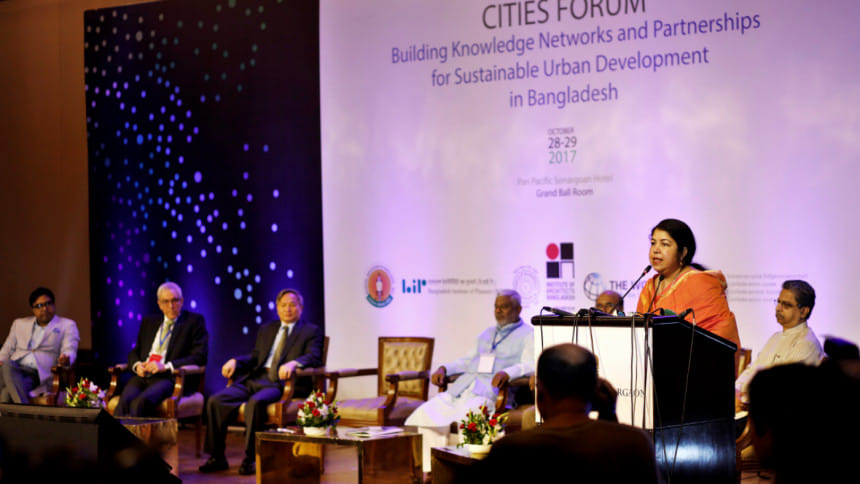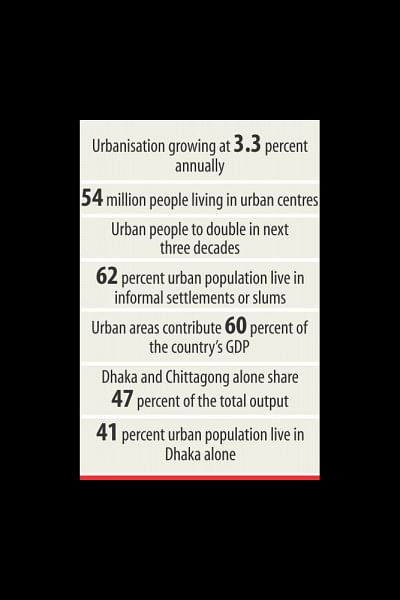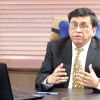Get good governance

Strong governance is the key to planned urbanisation in Bangladesh, said urban experts from home and abroad at an international conference in Dhaka yesterday.
“The current governance structure is not conducive for Dhaka to become a liveable metro city,” said Balakrishna Menon Parameswaran, lead urban specialist of the World Bank, adding, “Combination of leadership, planning and investment, and meaningful consultation is required for transforming Dhaka into a liveable city.”

Lack of proper policies or wrong policies or a combination of both was holding back the desired urbanisation in Bangladesh, he said. In an unprecedented event, 20 lakh people moved into Dhaka in the last five years, he said.
The World Bank, Municipality Association of Bangladesh, Institute of Architects Bangladesh, Bangladesh Institute of Planners, and Institute of Engineers Bangladesh jointly organised the two-day conference on “Cities Forum: Building Knowledge Networks and Partnerships for Sustainable Urban Development in Bangladesh” at the Dhaka Sonargaon Hotel.
Balakrishna underscored the need for empowering the elected city mayors.
“Strong urban governance is what we need,” said Rene Holenstein, the Swiss ambassador to Bangladesh.
Qimiao Fan, World Bank country director, said only well-managed urbanisation could lead to sustainable economic growth, allowing productivity and innovations.
In recent years, Bangladesh has experienced an annual urbanisation growth of 3.3 percent with 5.4 crore people living in the urban centres and the number is predicted to double in the next three decades or so, he said.
Urban areas contribute 60 percent of the country's GDP, and Dhaka and Chittagong together share 47 percent of the total output, Fan said.
This urbanisation is expanding job and manufacturing opportunities, he said, adding that more work was needed to fully capture the enormous benefits of urbanisation.
Bangladesh needs to address the critical challenges brought about by the massive unplanned urbanisation, characterised by high-level poverty, and generally poor housing conditions and liveability.
More than one out of five urban dwellers in Bangladesh lives in poverty, Fan said.
According to Bangladesh Bureau of Statistics, nearly 62 percent of the urban population, which is about 3 crore people, currently live in informal settlements and slums.
The country's urban centres need a minimum of $2 billion annual investment for basic infrastructure, such as roads, water and sanitation, to meet the demand of the rapidly growing urban population, Fan said.
In Bangladesh, only three percent of the total public expenditure is on urban infrastructure development, which is very low by global standards. Bhutan spends 16 percent, Nepal 10, Indonesia 34 and South Africa 52 percent, he said.
Dhaka South City Corporation Mayor Mohammad Sayeed Khokon said lack of adequate urban planning has led to today's civic woes, traffic congestion and flooding.
Narayanganj City Corporation Mayor Salina Hayat Ivy said there had always been an effort to keep the local government institutions submissive.
“We as the elected mayors cannot exercise the power provided by the present law and cannot play our mandated roles,” she said.
Different municipalities have different problems and the government needs to address them separately, she said.
Md Akter Mahmud, a professor at the department of urban and regional planning of Jahangirnagar University, pointed out several challenges in urban planning in Bangladesh.
He said Dhaka became the centre of politics, employment, amenities and facilities. “Every year 100,000 people are being added to existing population,” he said, adding that 41 percent of total urban population live in Dhaka.
“Local bodies are not equipped or do not have the technical and financial strength. They also do not have the visionary leadership,” he said suggesting that mayors of municipalities increase income generation capabilities instead of depending on funding from donor agencies and the government.
Akter said every year the country loses one percent of arable land due to unplanned urbanisation.
Robert Cervero, a professor at the department of city and regional planning of the University of California, urged focusing on Dhaka's transportation problems.
He said, “Yes, we need flyovers but there has to be other facilities and strategies to address the city's transportation problems.”
He emphasised the need for introducing mass transportation facilities to curb traffic congestion.
Ralph Becker, former mayor of Salt Lake City, Utah, said galvanising collaboration among all stakeholders with a common goal of public good is what a mayor could facilitate.
Chief guest Speaker Shirin Sharmin Chaudhury said a comprehensive approach of professional groups and experts was needed to address the complex urbanisation issue.
Md Abdul Baten, president of Municipal Association of Bangladesh, chaired the inaugural session in which 300 mayors, councillors and urban practitioners took part.
Mel Senen S Sarmiento, who had been the mayor Calbayog city of the Philippines for nine years, also spoke on the occasion.

 For all latest news, follow The Daily Star's Google News channel.
For all latest news, follow The Daily Star's Google News channel. 








Comments